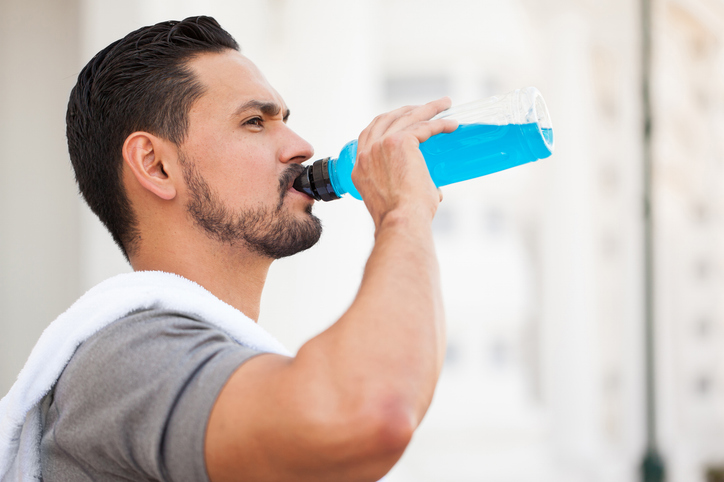Staying hydrated is essential to living a healthy life. Obviously, we all need water for day-to-day bodily function, but when you’re sweating a lot (like when you’re working out), it’s crucial that you quickly replenish the fluids that you’ve lost through sweat.
Plain water is OK, but supplemental hydration beverages help add essential electrolytes and carbohydrates for more effective fluid absorption.
Electrolyte salt drinks are everywhere right now. But are they really better?
Read on to learn why Beachbody Performance Hydrate can be a better option, especially if you’re regulating your daily sodium intake.
What’s Up with Sodium and Electrolyte Drinks?

It’s healthy to work up a sweat when you’re exercising, but it’s important that you replenish what you lose through sweat in order to maintain performance, aid recovery, and of course, avoid dehydration. One of the best ways to do this is with a hydrating electrolyte drink.
Some electrolyte beverages are full of sugar, which can cause a glucose spike, but many of the sugar-free varieties have an excessive amount of sodium. The sodium in electrolyte mixes helps aid in your body’s rapid absorption of fluids, but if you’re on a salt-restricted diet, you need to be cautious how much you consume.
Here are some quick facts to consider:
- According to the CDC, the leading cause of death in the US is heart disease
- Consuming too much sodium can increase your blood pressure and risk of heart disease and stroke
- According to the American Heart Association (AHA), we need a minimum of 500 mg of sodium for bodily functions, with an ideal maximum of 1500 mg.
Some of the most popular hydration mixes contain 20% to 67% of the AHA’s ideal intake of sodium for those looking to reduce their consumption of the mineral — meaning you have to cut salt elsewhere (and who wants to eat bland food?). But we’ve got a better way: Beachbody Performance Hydrate!
Why Beachbody Performance Hydrate?
Beachbody Performance Hydrate is a better option for people looking for optimal hydration without overdoing their salt intake — a recipe for success when it comes to managing your sodium intake.
At only 230 mg per serving, Hydrate contains just 15% of the AHA’s suggested 1,500 mg daily sodium intake and just 10% of the FDA’s 2,300 mg daily recommended intake (%DV) of sodium. By comparison, at 300 mg of sodium Nuun Sport Hydration Lemon Lime contains 20% of the AHA suggestion and 13% of the FDA’s DV; at 560 mg of sodium Liquid I.V. Hydration Multiplier Lemon Lime has 37% of the AHA suggestion and 24% of the FDA’s DV; and at 1,000 mg of sodium LMNT Citrus Salt has 67% of the AHA’s suggestion and 43% of the FDA’s DV. That leaves you hardly any room for additional salt to flavor your meals.
| BRAND | SODIUM | % AHA (1,500 mg) |
% FDA DV (2,300 mg) |
| BBP Hydrate | 230 mg | 15% | 10% |
| Nuun Sport Hydration Lemon Lime |
300 mg | 20% | 13% |
| Liquid I.V. Hydration Multiplier Lemon Lime |
560 mg | 37% | 24% |
| LMNT Citrus Salt | 1,000 mg | 67% | 43% |
But that’s not all that makes Hydrate so special:
- You get an ideal balance of carbohydrates and electrolytes that, when combined with water, creates the optimal osmolality for better fluid absorption during exercise. Hydrate’s solution is slightly lower than the osmolality of your blood, which means your body can absorb it better, easier, and faster for more effective hydration.
- You also get a beneficial amount of potassium, calcium, and magnesium.
- Hydrate also contains quercetin, a polyphenol with antioxidant-like properties to help support performance.
- It also contains low-level carbohydrates to help fluid absorption.
- Hydrate’s superior formula helps improve endurance, delay fatigue and sustain exercise performance.
- And of course, Hydrate is delicious, without synthetic colors, or artificial flavors, sweeteners, or preservatives.
Now you know why Hydrate actually hydrates you better than other electrolyte drinks. Learn more about it here.

